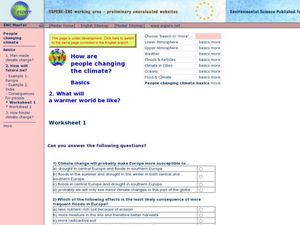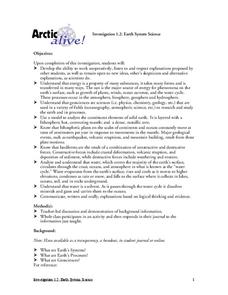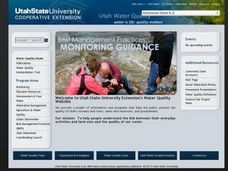Curated OER
Global Environmental Change
Students examine environmental change of land, water, and air, discuss Clear Skies Legislation, and experiment on solid compaction and
resultant water filtration.
Curated OER
THE FARMER CARES FOR THE LAND
Students will identify cause and effect relationships in issues relating to Agriculture and the environment.Ask students to describe what farmers do. Then ask students to define the word "environmentalist." Ask students if they have...
Curated OER
Renewable vs. Non-Renewable Resources
Here's a fine lesson on renewable and non-renewable sources of energy for your 5th graders. In it, learners list a number of natural resources on the board, then try to sort the resources into appropriate categories. This helps them to...
Curated OER
Biosphere
There is so much to learn about the different cycles, processes, and parts of the biosphere. Using a pretest as a formative assessment to see what your budding ecologists already know is a great way to figure out which important areas...
Curated OER
Rock Cycles, Crayon Cycles
Students examine the rock cycle and the path that rocks go through to rearranged in different ways. They define key vocabulary terms, then in small groups conduct a variety of experiments using crayon shavings as simulated rocks and...
Curated OER
Salt Marsh in a Pan
Students create a model of a salt marsh to discover the impact of pollution and human activities on water-based habitats including bays and the ocean. They recognize the relationship between natural and developed areas. Students impact...
Curated OER
THE PEANUT WIZARD
Students read information about George Washington Carver and outline the information. They are given peanuts in the shell, students examine them and eat them. Students discuss the following questions: Why did George Washington Carver...
Curated OER
Amazing Grazing: Keeping Our Ecosystem Running
Learners discover the value of sustainability within our ecosystem. In this ecological activity, students discuss the importance of a food cycle in our society, and how humans can improve the conservation of a healthy ecosystem....
Curated OER
Models as Tools for Ecosystem Management
Fifth graders explore the concept of environmental management. For this ecosystem lesson, 5th graders discover how models help scientists learn more about managing ecosystems. Students create their own model, make observations and...
Curated OER
Little Bloomers: Gardening With Trees
Learners identify the parts of tree flowers. They examine the role they have in pollination. They discuss trees that do not flower as well.
Curated OER
No magic borders
Students discuss what they have heard about pollution. They explore the purposes and limitations of political boundaries and borders and identify some of the causes and effects of pollution.
Curated OER
Environmental Education
Second graders examine how their choices affect the environment. They identify different types of pollution and its source. They ask questions to end the lesson.
Curated OER
Replanting the Rainforest
Students practice problem solving techniques. They interpret data gathered by student researchers in Australia about the effectiveness of various strategies for controlling weed growth in a newly replanted rainforest.
Curated OER
Food Webs
Students recognize interdependence in a food web by using yarn and notecards to create a food web and discussing what would happen if one of the organisms from a certain trophic level is removed.
Curated OER
Renewable vs. Non-Renewable Resources
Fifth graders, after brainstorming why conservation of resources is important, distinguish between renewable and non-renewable resources. They make a list of different types of natural resources on the board and then sort them into two...
Curated OER
How are People Changing the Climate: Basics
In this climate change worksheet, students answer a series of questions about climate change. Students have multiple choice options for six online quiz questions
Curated OER
Renewable vs. Non-Renewable Resources
Fifth graders identify renewable vs. non-renewable resources and comprehend why conservation of resources is important. They are asked what they think the words natural and resource mean. Pupils then put the words together to define...
Curated OER
Mangrove Ecology and Adaptations
Students create a plant or animal that would be well adapted to a habitat they selected. They first learn about Mangroves and their specific adaptations that help them survive in their habitat.
Curated OER
Mangrove Ecology & Adaptations
Learners creat a plant, animal, or other living organism that would be well adapted to a habitat that they previously selected. First they learn about adaptations of Mangroves.
Curated OER
Everyone Up!
Students examine various agriculture careers, both direct and indirect, related to crop production and distribution. In this food production activity, students role play the processing chain in which crops move from producer to processor...
Curated OER
Ecoregions of Texas
Seventh graders discuss why hunter-gatherers might have favored certain areas in which to live. In pairs, they research specific regions to examine in depth. Students present their eco-region vegetation findings (in this case Central...
Curated OER
Earth System Science
Students explore the Earth and its ability to support life. They discuss the geosphere and the water cycle and complete the Water Wonders activity. After completing the activity, they respond in their journals and reflect upon the...
Curated OER
Shake, Rattle and Roll
Students compare the weathering of materials. in this weathering lesson, students experiment with the chemical and physical weathering of different materials. Students use salt and water as an example of how weathering occurs.
Curated OER
Riparian Review
Students engage in the process of researching a riparian ecosystem. They conduct a field trip in order to obtain different types of data and work on measurement skills to analyze data to form a conclusion about the biotic factors of the...

























